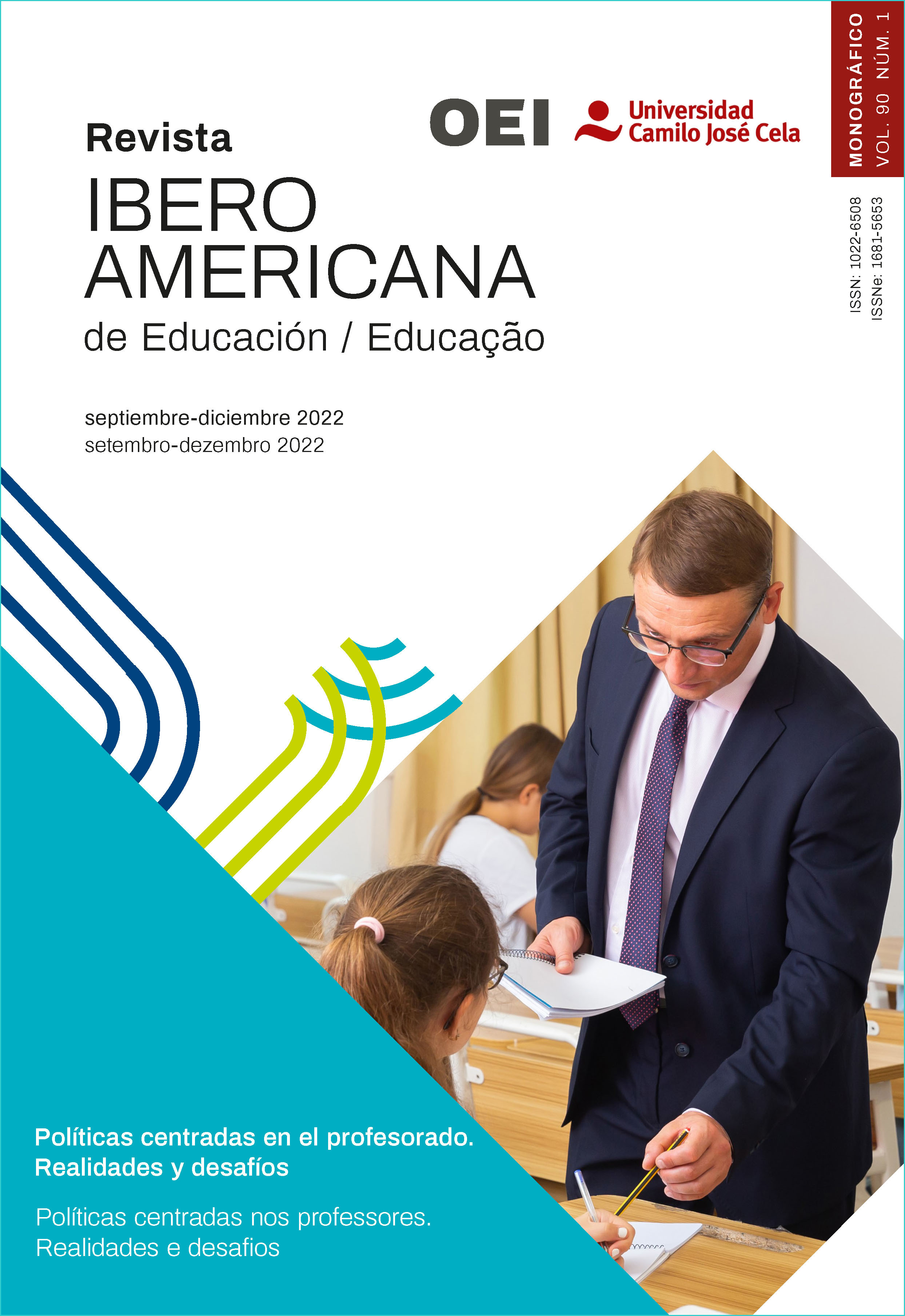Cómo apoyar y cómo abandonar a los profesores en la batalla por el éxito educativo. La experiencia de Portugal entre 1995 y 2020
DOI:
https://doi.org/10.35362/rie9015440Palabras clave:
políticas educativas; evaluación educativa; currículo, formación del profesorado; historia de la educación; PISA; TIMSSResumen
Durante los últimos años del siglo XX y las dos primeras décadas del siglo XXI, la educación en Portugal sufrió varios cambios. Como resultado, su situación fue mejorando casi continuamente hasta el 2015. Siendo ese año en el que Portugal obtuvo los mejores resultados de su historia en las comparaciones internacionales PISA y TIMSS. Luego, sufrió algunos retrocesos a partir de 2016, como revelan los resultados de PISA 2018 y TIMSS 2019. En este artículo se analizan los principales factores de esta evolución, destacando la capacitación de los profesores para el buen desempeño de sus tareas.
Descargas
Citas
Ausubel, D. (1963). The Psychology of Meaningful Verbal Learning, Nova Iorque: Grune & Stratton.
Bergbauer, Annika B., Hanushek, Eric A., & Woessmann, Ludger (2021). Testing, Journal of Human Resources. https://www.doi.org/10.3368/jhr.0520-10886R1
Candeias, A. e Simões, E. (1999). Alfabetização e escola em Portugal no século XX: Censos Nacionais e estudos de caso, Análise Psicológica 1(XVII), 163-194.
CESE (2017). How schools can improve literacy and numeracy performance and why it (still) matters, New South Wales Department of Education. Centre for Education Statistics and Evaluation. Disponível em https://bit.ly/3D4PUaS.
Crato, N. (2006a). O ‘Eduquês’ em Discurso Directo: Uma Crítica da Pedagogia Romântica e Construtivista, Lisboa: Gradiva.
Crato, N. (Coord.) (2006b). Desastre no Ensino da Matemática: Como Recuperar o Tempo Perdido. Lisboa: Sociedade Portuguesa de Matemática e Gradiva.
Crato, N. (Coord.) (2011). Ensino da Matemática: Questões e Soluções. Lisboa: Fundação Calouste Gulbenkian.
Crato, N. (2019). Everything starts with the curriculum, ResearchED Magazine 3, https://bit.ly/3TaDQdI.
Crato, N. (2020). Curriculum and Educational Reforms in Portugal: An Analysis on Why and How Students’ Knowledge and Skills Improved. In: Reimers, F. (eds) Audacious Education Purposes. Springer, Cham. https://doi.org/10.1007/978-3-030-41882-3_8 (Tradução para castelhano: Crato, N. (2021). Reformas educativas y curriculares en Portugal: análisis de cómo y por qué han mejorado los conocimientos y las aptitudes del alumnado. In: Reimers, F. (eds) Propuestas educativas audaces, UCJC Stamp, Universidad Camilo José Cela, Madrid).
Crato, N. (2021). Setting up the Scene: Lessons Learned from PISA 2018 Statistics and Other International Student Assessments. In: Crato, N. (eds) Improving a Country’s Education. Springer, Cham. https://doi.org/10.1007/978-3-030-59031-4_1
Crato, N. (2022). Math curriculum matters: Statistical evidence and the Portuguese experience. Eur. Math. Soc. Mag. 124, pp. 49-56. https://doi.org/10.4171/MAG/83
Da Silva, A. (1939). O Método Montessori, Lisboa: Inquérito.
FFMS (2022). Pordata. Estatisticas sobre Portugal e Europa. Lisboa: Fundación Francisco Manuel dos Santos. Disponível em https://bit.ly/3T3m4Jh
Hanushek, E. A., Piopiunik, M. & Wiederhold, S. (2019). Do smarter teachers make smarter students?: International evidence on teacher cognitive skills and student performance, Education Next, 19(2), 57-64. Disponível em https://bit.ly/3CHfvp5
Lusa (02 Novembro 2017). Ministro da Educação promete “lutar radicalmente” pelos professores, Diário de Notícias. Disponível em https://bit.ly/3EGNj87
Marsden, W. E. (2001). The School Textbook: Geography, History and Social Studies, Routledge.
McDaniel, M. A. & Callender, A. A. (2008). Cognition, memory, and education, em Roediger, H. L., Cognitive Psychology of Memory, vol. 2 de Learning and Memory: A Comprehensive Reference, (pp. 819-844) Oxford, Elsevier.
ME (1997). Decreto-Lei 229/97 de 30 de agosto. Direção Geral de Educação (DGE). Ministério da Educação. Disponível em https://bit.ly/3gahhY6
MEC (2006). Plano de Acção para a Matemática. Direção Geral de Educação (DGE). Disponível em https://bit.ly/3eDN6Ig
MEC (2012). Decreto-Lei 176/2012 de 2 de agosto. Ministério da Educação e Ciência. Diário da República n.º 149/2012, Série I de 2012-08-02, páginas 4068-4071. Disponível em https://bit.ly/3VpxmcD .
Morris, A. (2011). Student standardized testing: Current practices in OECD countries and a literature review, OECD Working Paper Series No. 65
NCES (2022). National Center for Education Statistics. https://nces.ed.gov/surveys/international/ide/
OECD (2016). PISA 2015 Results (Volume I): Excellence and Equity in Education, OECD Publishing, París. http://dx.doi.org/10.1787/9789264266490-en.
OECD/UNESCO (2003). Literacy skills for the world of tomor- row: Further results from PISA 2000. Institute for Statistics. Paris: PISA/OECD Publishing. https://doi.org/10.1787/9789264102873-en
Roediger, H. L., Karpicke, J. D. (2006). Test-enhanced learning: Taking memory tests im-proves long-term retention, Psychological Science, 17, 249-255.
Roediger, H. L., Smith, M. A. & Putnam, A. L. (2011). Ten benefits of testing and their applications to educational practice. In Ross BH (ed.), Psychology of Learning and Motivation, San Diego, Elsevier Academic Press.
Rosário, P. S. L. e Almeida, L. S., (2005). Leituras construtivistas da aprendizagem, in Guilhermina Lobato Miranda e Sara Baía (orgs.). Psicologia da Educação: Temas de Desenvolvimento, Aprendizagem e Ensino. (pp. 141–165). Lisboa: Relógio D’Água.
Rugg, H.O. (1928). The Child-Centered School. Nova Iorque, World Book Company
Wiliam, Dylan (2018). Creating the Schools Our Children Need. West Palm Beach, FL: Learning Sciences.
Cómo citar
Publicado
Número
Sección
Licencia
Aquellos autores/as que tengan publicaciones con esta revista, aceptan los términos siguientes:
















